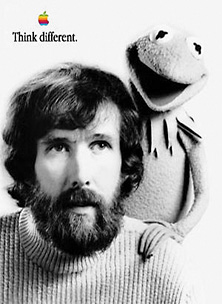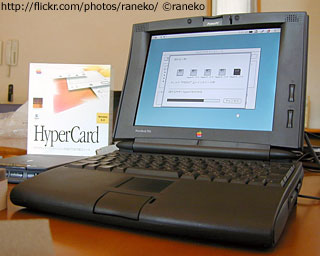Are the Apple product lines due for a refresh? It has been more than a decade since Apple last changed its naming conventions, and with the reported planned move to its own chips in 2020 by the Cupertino, Calif. based tech company bringing its production in-house, maybe it’s time for a change once again.
A famous Apple ad campaign that ran from 1997 to 2002 told Mac users to Think Different, and Apple should be taking a page out of its own playbook for its product lines moving forward with the transition in two years to ARM processors.
that ran from 1997 to 2002 told Mac users to Think Different, and Apple should be taking a page out of its own playbook for its product lines moving forward with the transition in two years to ARM processors.
In 2006, when Apple made the move to Intel processors, all the names of its computers changed save for the iMac and the Mac mini, which remained the same. The iBook notebook computer line for consumers became the MacBook, the PowerBook notebook computer line for prosumers became the MacBook Pro, and the Power Mac desktop computer line for prosumers became the Mac Pro.
Apple has made only two new variations of its computer lines since then with the release of the MacBook Air in 2008 and, most recently, the iMac Pro in 2017.
Apple Naming Conventions
In the past, Apple has only used the words “Apple” or “Macintosh” in its computers’ names: Apple II / III and Macintosh II / Centris / Classic / Classic II /Color Classic / LC / LC II / LC III / Performa / Plus / Portable / Quadra / SE.

The PowerBook 550c (image ©raneko)
Then there were the words “Power” and the lower-case letter “i” in tandem with either “Macintosh” or “Mac” for Power Macintosh, Power Mac, and iMac (with the exception of “i” combined with “Macintosh”) and then along with the word “Book” for their notebook computers, the PowerBook and iBook, and later going with “Mac” and “Book” dropping the “Power” and “i” as you know to get MacBook / MacBook Air / MacBook Pro.
The standalone “Mac” models would be the Mac mini, the Mac Pro, and the eMac which is almost unique in nature since the “e” (short for education) was never used for anything else but still has the root word of “Mac” in its name.  The word “Power” was replaced by “Pro” to classify models designed for prosumers while the “i” with the exception of the iMac (and its software and apps bearing said lowercase letter) became the moniker for its iOS devices: the iPad, iPhone, and iPod touch. Apple has returned to the use of the word “Apple” for its Apple Pencil / TV / Watch. (Interesting to note for those that may not be familiar is that the Apple TV was originally code-named “iTV”.).
The word “Power” was replaced by “Pro” to classify models designed for prosumers while the “i” with the exception of the iMac (and its software and apps bearing said lowercase letter) became the moniker for its iOS devices: the iPad, iPhone, and iPod touch. Apple has returned to the use of the word “Apple” for its Apple Pencil / TV / Watch. (Interesting to note for those that may not be familiar is that the Apple TV was originally code-named “iTV”.).
Is Apple Removing the ‘i’ from non-iOS Lines?
In an article written in February of this year by Macworld magazine former editor-in-chief Jason Snell, he wrote that Apple was taking the lowercase “i” out of its apps and software products, such as changing the iBooks app to simply Books.
With the newest product from Apple – the Home Pod – not bearing any semblance of the current naming convention of “i” (or “Apple” for that matter) in its name, this does sort of beg the question. Will Apple also be renaming all of its other products that currently have an “i” in their names in the very near future, such as the iPhone, iPad, iPod touch, and the iMac?
It makes more sense to leave all the iOS-based devices with the lowercase “i” in their names as well as changing the iMac to just Mac since it does not run iOS.
The last idea there is something I discussed with Low End Mac publisher Dan Knight 11 years ago, back in May 2007, when I was just a reader of the site and wrote to him to respond to his article, “Rebranding: They’re All Just Macs Now“. We also discussed the loss of the iBook and PowerBook names.
The following are our emails to each other with his response to my message (with our email addresses edited out).
“The Press Box @ PBCentral.com”
<pismopb900@********.com> wrote:
Hi Dan,
I liked your story today about Steve Jobs making all the Macs universal.
I don’t like how they got rid of the name PowerBook because it’s like they lost something BIG. Like you said, it was a recognized name associated with Apple, never mind that it didn’t have the word “Mac” in it.
We associate “4Runner” and “RAV4” and “Camry” with Toyota, but there is not “Toyota” in the name.
Your article does beg one question. Should iMac turn into just, the “Mac” suggesting a return to Apple’s origins when they just had a computer called the Mac, as you pointed out too.
Hmm. Gives me an idea for a story. Since they’re supposedly coming out with the next version of the iMac to reflect the change to Intel, since, they kept the form factor of the iMac G5 (well, they did too with the MacBook Pros) when they turned them into Intel-based machines.
What computer do you have? I have a Mac. (You mean iMac? No, I have, a Mac).
Joe Leo, Columnist
PBCentral.com
“Your Mac® Notebook Resource”
[formerly PowerBook Central]
• news/reviews/opinion, classifieds, plus the latest and lowest prices (since 1996)
FOR THE LATEST ARTICLES & COLUMNS-
http://www.pbcentral.com/columns/********_leo/
From: Dan Knight <low_end_mac@********.com>
Date: May 1, 2007 at 6:55:13 AM PDT
To: “The Press Box @ PBCentral.com” <pismopb900@********.com>
Subject: Re: Macs
Joe,
I feel your pain. PowerBook was a great brand, and there was absolutely no reason for Steve Jobs to get rid of it except that it wasn’t invented on his watch. It took a while, but the MacBook name is finally comfortable.
iMac was Jobs’ first new brand after returning to Apple, so I doubt he’ll ever rename the iMac. It’s a solid, well-known brand. Of course, we can call all of our iMacs, iBooks, PowerBooks, Power Macs, and minis “Macs” if we want to…
Dan
So, unless the iMac sports a touchscreen anytime soon and runs iOS, it should be renamed the Mac. Either that or the new iMac would be just that. A new machine with an ARM processor inside, a touchscreen display, and iOS as its operating system – and we get a totally new computer and design called the Mac.
Which brings us back to the whole reason I revisited the Apple product line naming conventions in the first place, thanks to Macworld’s Snell.
Resurrecting the iBook Name?
As I posited in an article last month, what if the reason Apple was taking back the iBook name — originally used for its iconic notebook computer and then for its e-books app — so that they could reuse the name and resurrect the consumer notebook line for a new touchscreen-enabled notebook computer built with an ARM processor inside and running iOS as its operating system?
A new iBook would fit nicely into the iOS device family, along with the iPad, iPod touch, and iPhone.
And since there is an iPad and an iPad Pro, an iMac plus an iMac Pro, also with an ARM processor running iOS, would fit nicely into the equation.
The iMac Is Getting Old
And I really do think its time Apple released a new style computer. The iMac was released two decades ago and is becoming kind of an old relic – at least in terms of its name, if not its flat screen design as well.
How awesome would it be to have a totally brand new desktop computer with a unique form factor called “the new Mac”?
But again, that’s why turning the iMac into a touchscreen display with iOS as its operating system would make sense now that Apple is moving to ARM processors (assuming the reports are indeed true).
That idea isn’t so farfetched, because there is already an Apple patent for such a machine which they applied for back in 2010 dubbed by Patently Apple as the “iMac touch”.
Too Many iProducts?
I agree with Snell that Apple has gone wild with overuse of the “i” for its products (though that wasn’t his exact thought). If anything, I think using “Apple” in the name would be the next best choice. Apple Phone, Apple Pad, Apple Pod touch, etc.
That is if Apple were to continue to extend the removal of the “i” from its hardware like they are doing with their apps and software. Though it could well be that they are reserving the little lowercase letter solely for their iOS devices, which is entirely plausible.
The way I see it if they don’t come up with something unique and grand – should they decide to once again rename their products with the shift to ARM processors – at least reorganize the product line. Like I said, reserve the “i” for its iOS devices, keep “Mac” for its computers, and use “Apple” for everything else.
Why Hasn’t Apple Used Apple-Based Names (Other than Macintosh)?
Makes you wonder why Apple computers aren’t named after actual varieties of the fruit its named for in the first place. The Macintosh, Fuji, Granny Smith, etc. (I am only kidding!)
Then again, maybe a new Apple computer bearing the name of one of those varieties could be the basis for a new naming convention come 2020?
keywords: #leoandmac
short link: https://goo.gl/wYm1w3

